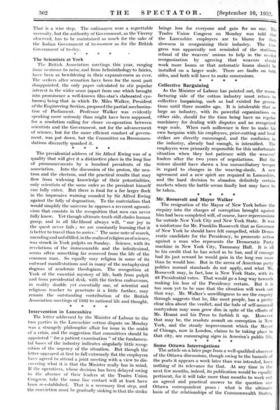Intervention in Lancashire The letter addressed by the Minister of
Labour to the two parties in the Lancashire cotton dispute on Monday was a strangely philosophic affair for issue in the midst of a crisis, and the suggestion that committees should be appointed "for a patient examination " of the fundamen- tal bases of the industry indicates singularly little recog- nition of the urgency of the situation. But though the letter appeared at first to fall extremely flat the employers have agreed to attend a joint meeting with a view to dis- covering what it is that the Minister really has in mind. If the .operatives, whose decision has been delayed owing to the absence of their leaders at the Trades Union Congress, take the same line contact will at least have been re-established. That is a necessary first step, and the conviction must be gradually sinking in that the strike brings loss for everyone and gain fir no one. The Trades Union Congress" on Monday was told that the Lancashire employers are to blame for their slowness in reorganizing their industry. The Con, gress was apparently not reminded of the stubborn refusal of the weavers' unions to help in the needed reorganization by agreeing that weavers should work more looms or that automatic looms should be installed on a larger scale. There are faults on both sides, and both will have to make concessions.






























 Previous page
Previous page